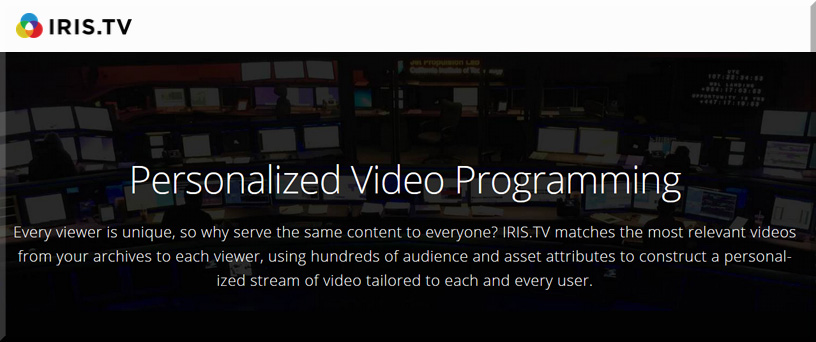IRIS.TV Finds Adaptive Video Personalization Increases Consumption by 50% — from appmarket.tv by Richard Kastelein
Excerpt (emphasis DSC):
IRIS.TV, the leading in-player video recommendation engine, reports that its programmatic video delivery technology, Adaptive StreamTM, has increased video consumption by 50% across all its clients. The results of these findings just further solidifies that consumption of online video is significantly enhanced by a personalized user experience.
By integrating Adaptive StreamTM in their video players and mobile apps, IRIS.TV’s clients are able to deliver the most relevant streams of video to their viewers, just like TV. Yet unlike TV, viewers’ feedback is captured in real-time through interactive buttons, allowing the stream to dynamically adapt to the changing preferences.
Press Release: IRIS.TV Launches Personalized End-screen for Online Video with Kaltura — from iris.tv
IRIS.TV Partners with Kaltura to offer programmatic content delivery and in-player thumbnail recommendations
Excerpt:
Los Angeles, May 4, 2015 – IRIS.TV the leading programmatic content delivery system, today announced a new dynamic, personalized end-screen plugin for Kaltura, provider of the leading video technology platform.
IRIS.TV’s new plugin for Kaltura will offer clients of both a personalized and dynamic stream of video along with a personalized end-screen framework. Publishers can now provide users with both dynamic streams of video – powered by consumption and interaction – along with thumbnail choices specific to their real-time consumption habits. This new integration supplies publishers with additional tools to deliver a more personalized viewing experience in order to maximize viewer retention and video views. The partnership is aimed to help consumers discover relevant and engaging content while viewing across all connected devices.
From DSC:
Now imagine these same concepts of providing recommendation engines and personalized/dynamic/interactive streams of content, but this time apply those same concepts to delivering personalized, digital learning playlists on topics that you want to learn about. With the pace of change and a shrinking 1/2 life for many pieces of information, this could be a powerful way to keep abreast of any given topic. Team these concepts up with the idea of learning hubs — whereby some of the content is delivered electronically and some of the content is discussed/debated in a face-to-face manner — and you have some powerful, up-to-date opportunities for lifelong learning. Web-based learner profiles and services like Stack Up could continually populate one’s resume and list of skills — available to whomever you choose to make it available to.
Along these lines, also see:
- Nearly 1 billion TV sets Internet connected by 2020 — from appmarket.tv
Excerpt:The number of TV sets connected to the Internet will reach 965 million by 2020, up from 103 million at end-2010 and the 339 million expected at end-2014, according to a new report from Digital TV Research.Covering 51 countries, the Connected TV Forecasts report estimates that the proportion of TV sets connected to the Internet will rocket to 30.4% by 2020, up from only 4.2% at end-2010 and the 12.1% expected by end-2014. South Korea (52.7%) will have the highest proportion by 2020, followed by the UK (50.6%), Japan (48.6%) and the US (47.0%). – See more at: http://www.appmarket.tv/connected-tv/2572-nearly-1-billion-tv-sets-internet-connected-by-2020.html#sthash.BJWdCgbv.dpuf
- McDonnell – HTML5 is the true Second Screen, Social TV winner — from appmarket.tv
Excerpt:
After years of evolution, the W3C has finally declared the HTML5 standard complete. When Steve Jobs “declared war on Flash” he gave HTML5 a fighting chance of dominance. In parallel, businesses started to recognise the potential of Social TV or “Second Screen” behaviour to re-invigorate old media and drive revenue to newer social platforms like Twitter. The ensuing debate centred on winners and losers, but with such a diverse global broadcasting market and no social network with dominance in all countries, could the web standard be the ultimate winner? I think it already is.










![The Living [Class] Room -- by Daniel Christian -- July 2012 -- a second device used in conjunction with a Smart/Connected TV](http://danielschristian.com/learning-ecosystems/wp-content/uploads/2012/07/The-Living-Class-Room-Daniel-S-Christian-July-2012.jpg)
